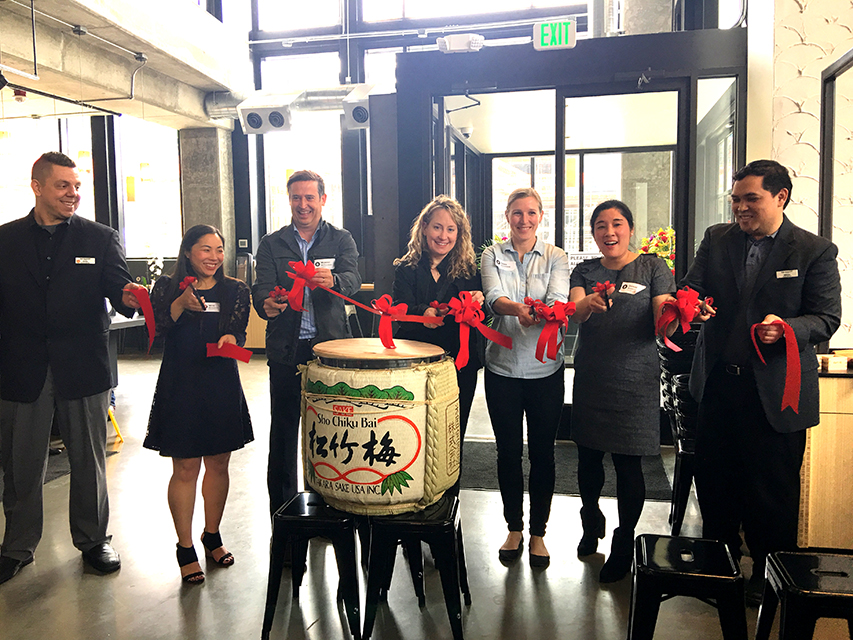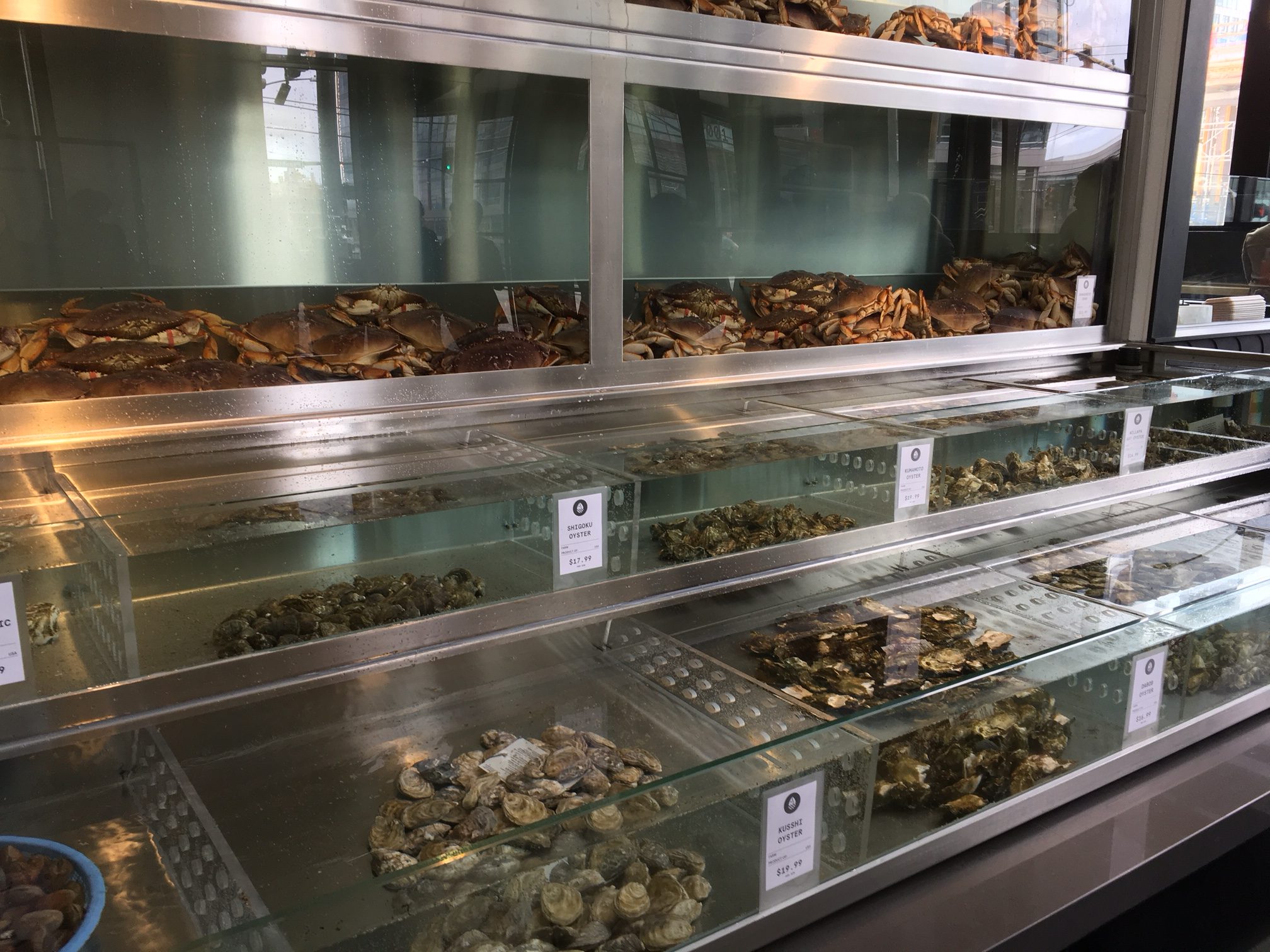By Assunta Ng
NORTHWEST ASIAN WEEKLY

Photo provided by Denise Moriguchi
When a Seahawks player couldn’t pronounce “Uwajimaya” in a television interview, CEO Denise Moriguchi had a revelation.
As Uwajimaya’s third-generation owner, Moriguchi, 40, understood that the name Uwajimaya has no meaning to outsiders or newcomers, even though it is the largest local Asian grocery store and has 88 years of history. Uwajimaya was the village of her grandfather before he emigrated from Japan to America.
Through a Google search, Moriguchi also noticed that people who searched Uwajimaya, didn’t know how to spell it. She realized the company’s new store would need a new identity and name, easy to read and remember, to appeal to the masses, especially the younger crowd.

Photo provided by Denise Moriguchi
Inspired by the ocean, Kai Market (KM) was born. Who doesn’t relate to waves, water, stillness, and serenity? To their delight, Kai’s meaning is universal in Asian cultures — positive energy and good luck. Contrary to what people assume, Kai (meaning ocean and shell), is not just of Japanese origin. It means “ocean and water” in Hawaiian, “open” and “victory” in Chinese, and “universe” in Persian. The implication of an ocean is abundance and luck in Asian cultures.
Located at 400 Fairview Avenue North, Kai is in a booming area of condominiums, apartments, and office buildings. “We look for density,” said Moriguchi, “underserved areas and growing” for the new store.

Kai Market storefront (Photo provided by Denise Moriguchi)
Not a typical Asian store
Kai represents Uwajimaya’s younger generation’s vision of multicultural stores — smaller, elegant, and with a twist of the ocean.
Kai is not a traditional deli. It has an appetizing and healthy salad selection, Asian hot foods, and beer, wine, and sake.

Beer, sake, and wine section (Photo by Assunta Ng/NWAW)
Millennials like to try out new things. They are usually world-travelers and knowledgeable about Asian foods. “They are not afraid to try squids,” said Moriguchi. They tend to eat out more and prefer convenience. For those who don’t cook and don’t want to dine out, KM offers take-out for dinner and lunch.
Just the seafood section is impressive. Nine different kinds of live oysters and fresh fish are displayed in the clean water tank.

Seafood section (Photo by Assunta Ng/NWAW)
They also offer poke bowls, sushi and musubi. The take-out menu is constantly changing, and the owners hope to lure shoppers to check out the new items every day.
Influenced by Japan, its simplicity in design reflects calmness and the beauty of the ocean with modern bamboo, metal, tiles, integrated with soothing colors and handmade elements.

Salad section (Photo by Assunta Ng/NWAW)
The strategy for the new store is “not cluttered,” Moriguchi said. The regular Uwajimaya store, with over 21,000 items, could have as many as 20 kinds of soy sauce on the shelf. Of the 1,100 items at Kai, every product is carefully chosen, said Moriguchi.

Gifts and greeting cards (Photo by Assunta Ng/NWAW)
In the first week of business, it already has attracted a good lunch crowd and many curious residents and workers. The challenge for the young Moriguchi is to ensure the crowd would spill over to the dinner hours, and shop in Kai’s other sections, including seafood and perhaps pick up a case of local or Japanese beer.

Denise Moriguchi and cousin, Miye Moriguchi (Photo provided by Denise Moriguchi)
Two-women team and a small store concept
Boldness is exhibited in the new store. It is a “learning lab” for the next generation, said Moriguchi. With 5,500 square feet, Kai is only one-eighth the size of a typical Uwajimaya store. It’s a place for them to “make mistakes,” experiment, and try out what works, said Moriguchi. “We have tried new technologies (at Kai), such as wifi, a (new) phone system, and a live inventory system, knowing exactly the number of items on shelves.” If it works, it will be implemented in the bigger stores. If it doesn’t work, they can change course quickly, said Moriguchi, because they have to train fewer employees, as opposed to the hundreds of staff members in a regular Uwajimaya store.
The family has four other stores in the ID, Bellevue, Renton, and Beaverton, Ore. Former CEO Tomoko Matsuno first had the idea of the smaller market concept, according to Moriguchi. The younger generation took the idea and made it happen. She and her cousin Miye, the development manager, teamed up, bounced ideas off one another, and came up with the Kai concept. Moriguchi said Miye, an architect and designer, often looks from the aesthetic view, and Moriguchi, who has an MBA, brings the practical aspect to the discussion. “We balance each other.” Mia’s father Toshi is on the Uwajimaya board and Moriguchi’s father is Tomio, the company’s former chairman. Moriguchi’s goal is to open another market in two years, and remodel its 18-year-old flagship store in the International District.
Kai is open Monday through Friday, 10 a.m.–8 p.m., Saturday, 10 a.m.–5 p.m., and closed on Sundays.
Assunta can be reached at assunta@nwasianweekly.com.



